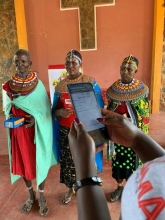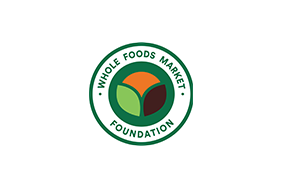Whole Planet Foundation and Our Partners Respond to COVID-19
by Daniel Zoltani, Global Programs Director
Published 03-25-20
Submitted by Whole Foods Market Foundation

I am not sure where in the world you are located, but your lifestyle has surely been impacted by what has been happening. Social distancing is the new normal, schools are closing, businesses are closing, and borders are closing. Never in my lifetime has a single threat engulfed the whole world at once. No doubt these are challenging and ever-changing times, and as our Executive Director points out, we are living history.
I want to share with you how microfinance is responding to this coronavirus, and its impact on the microentrepreneurs we support through our network of partners on the ground in communities around the globe.
Microfinance clients do not have the luxury of working from home. If their businesses stop, they do not have paid sick leave. As we know well, microcredit has the potential to provide opportunity by jumpstarting or fueling small business, but it does so much more for those living precarious and volatile lives. Access to capital, when provided in a responsible and client-centered way, smooths consumption, offers protection from economic shocks, encourages long-term planning rather than the stress of living day to day, empowers women, and promotes productive investment.
Microcredit is a lifeline for our beneficiaries’ businesses and thus their livelihoods and it is exactly during times of crisis that it is most important. We have seen this before in West Africa during Ebola, in the Philippines after Super Typhoon Yolanda, the massive 2010 earthquake in Haiti, the earthquake of 2015 in Nepal, typhoons across the Pacific and from countless regional wars and conflicts. In a nutshell, here is what we have learned about disasters from working across 77 countries:
As always, poor and marginalized people without access to adequate safety nets are the most at risk
Shocks cause people to fall back into poverty
Disasters result in significant loss of livelihood
Programming is impacted by disruption of market and supplies chain activities, including closing of local and livestock markets
Whole Planet Foundation field partners work in both the immediate response and long term reconstruction process
Over the years of working with some of the best microfinance organizations around the world, we have observed the following best practices from our microfinance partners during a crisis:
Prepare relief kits
Suspend loan repayments
Offer loan restructuring
Offer bridge loans
Offer emergency low-interest loans
Offer new reconstruction/housing loans
Link affected clients with relief efforts
Help transmit public health messages
It is no surprise to me that many of our microfinance partners have already leapt to action in response to COVID-19. Many have taken a number of steps to safeguard and support their staff and borrowers and to mitigate/minimize risks to the organization. Here are some of the first responses reported:
In Kenya, our partner BOMA, has set up a COVID-19 Task Team that has started to communicate best practices on personal hygiene and social distancing to prevent and minimize the spread of COVID-19 virus and instructions on the changes taking place in how BOMA conducts daily business. All international travel, as well as travel between field and regional offices, has been suspended until further notice. All donor and partner visits have been suspended until further notice. In accordance with governments guidelines, the organization has curtailed their program mentorship and monitoring activities by restricting mentors’ movements to their own villages/locations. Mentors are instructed to avoid visits to towns, markets and BOMA businesses in densely populated areas. In remote villages, where it is difficult for participants to access information about this pandemic, BOMA mentors, in small group meetings, are sharing Ministry of Health guidance on COVID-19 and conducting training on hygiene and disease prevention.
BOMA’s early investment in using technology for program monitoring and management and equipping and training their field staff in the use of tablets is enabling them to quickly adapt to remote work, remote field staff support and management needs. They report:
Overall, we know that the coming days, weeks, and even months, will pressure test our organization’s ability to support both the needs of our staff and participants. However, we feel confident in the great attributes of BOMA as a resilient, adaptive, innovative, results and data driven organization. Our biggest asset, our dedicated board and staff remain healthy, strong and resilient. We are deeply rooted in, and continue to enjoy the support and buy-in from, the communities we work in. We have an incredible base of committed partners, donors and champions. That, we believe, will enable us to successfully navigate any obstacles ahead.
As this pandemic is a fluid situation, we will continue to provide regular updates to you as the situation evolves. We are grateful for your thought and financial partnership and remain committed to our mutual goal of ending extreme poverty in the drylands of Africa.
Our long-standing partner BRAC in Bangladesh reports:
Our teams are coordinating with the Government of Bangladesh, the World Health Organization, and relevant local authorities. Across the entire BRAC family, we are training our staff, as well as community health workers, in hygiene and awareness campaigns so they can educate the broader community about how to minimize health risks while ensuring their own safety. In the camps and settlements of Cox's Bazar, a city in southeastern Bangladesh, our health team is developing public health messages to protect the vulnerable communities that are sheltering there. In all instances, we are working in tandem with and in support of the work of national governments.
In Latin America, Chilean partner, Fondo Esperanza, is allowing for flexible payments through the end of March and assuring partners that late payments will not affect their account or ability to request future loans. In Paraguay, Fundación Paraguaya is promoting repayment through mobile banking and payments that can be done at various convenience stores; offering bank transfers for new/renovated loans and offering hygienic products to those who need them.
Our partner Grameen America, that operates across 15 U.S. cities, reports that its staff has been equipped with remote systems and processes to continue the organization's lending program to underserved women entrepreneurs. Grameen America reports:
Our priority remains working seamlessly as a team to support our branches and our members across the country. Our branch operations across the country have been set up to continue to serve our members during this time of uncertainty, transitioning to implementing remote systems and procedures. Center meetings will be conducted virtually for our borrowers, and disbursements and repayments will continue thanks to the digital technology innovation that has been in effect for several years nationwide.
As the impact on communities continues to escalate, we remain flexible and prepared with contingency plans in every scenario. We remain committed to operating our program and serving our members and their businesses across the country, who need the affordable and available access to capital and community support Grameen America offers.
While the Whole Planet Foundation team based around the world is grounded, our work is not on hold. We will continue to monitor existing projects, review authorized funding disbursements, and continue communicating with partners as they look to tackle this crisis. We are in the process of designing new processes to do this remotely, and even though we may have to change our approach, we will do all we can to maintain and increase the support we give, especially as the risks increase for the very poorest. It is now more important than ever.
At a time like this we all need to laugh, share, connect, and be together...from a safe distance. Please take good care of yourselves and those around you.
Learn more and support Whole Planet Foundation here.

Whole Foods Market Foundation
Whole Foods Market Foundation
Whole Foods Market Foundation is on a mission to nourish people and the planet by providing access to essential resources to improve nutrition and create opportunities for financial stability. Founded by Whole Foods Market, the registered 501(c)(3) non-profit organization based in Austin, Texas, encompasses the work of Whole Cities, Whole Kids and Whole Planet
WHOLE CITIES
Whole Cities improves individual and community health by expanding access to fresh, healthy food and nutrition education.
Wholecitiesfoundation.org
WHOLE KIDS
Whole Kids enhances children’s wellness by improving access to nutritious foods, supporting healthy food education, and building professional development to sustain those changes.
Wholekidsfoundation.org
WHOLE PLANET
Whole Planet helps people living in poverty build long-term financial resilience through income growth, savings, and access to essential resources like food, shelter, water & sanitation.
Wholeplanetfoundation.org
More from Whole Foods Market Foundation

